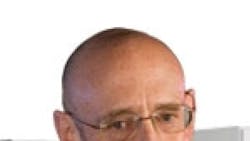Harry Moser has been an advocate for U.S. manufacturing for as long as he can remember. His father ran the Singer sewing machine factory in Elizabeth, N.J. "That's why I went into manufacturing," Moser is quick to point out. And throughout his nearly 25 years as an executive at Lincolnshire, Ill.-based Agie Charmilles LLC, Moser has been visiting schools to encourage kids to pursue careers in skilled trades such as precision machining and tool-and-die making.
Now that Moser is easing into retirement as chairman emeritus at Agie Charmilles, which makes electrical discharge machines, high-speed milling machines and automation for precision toolmakers and component manufacturers, he has more time to focus on a manufacturing cause that's near and dear to his heart: "reshoring."
"Reshoring is bringing back work, parts or tools that will finally be used in North America," Moser explains. "In other words, we're not saying that you should make everything here and ship it to China to assemble. We're saying if you have an end component that is sold into the North American market or assembled into a product at a North American factory, or a tool that's used in North America, and you're now having that work done overseas, to evaluate the total cost of that subassembly or tool in the States versus overseas. We believe you will decide more should be sourced here."
On a macroeconomic level, reshoring bolsters the U.S. manufacturing and defense base, creates jobs and reduces the trade and budget deficits. But Moser also believes there's an increasingly strong business case for bringing outsourced manufacturing work back to domestic soil, which he summarizes as a lower "total cost of ownership."
Too often, Moser says, manufacturers decide to offshore manufacturing work because the freight-on-board costs are lower for work done overseas. However, if those companies factor in the costs of regulatory compliance, potential intellectual property loss, visits to overseas vendors, potential product quality problems, high foreign wage inflation and carrying extra inventory as cushion against late or damaged shipments, "now the gap is favorable or small enough that it makes sense to reshore that work."
"We're trying to change the whole paradigm of thought" regarding offshoring.
-- Harry Moser, Agie Charmilles
Among the other harder-to-quantify benefits of reshoring, Moser explains, are the advantages of siting manufacturing operations closer to R&D activities and the reduced carbon footprint of shorter shipping distances.
"The companies that are heavily focused on being green can make a pretty good case that the total carbon footprint of a part made 100 miles away in the U.S. is maybe a half or a third of what it would be if it was made in China and then shipped over here," Moser asserts.
It's hard for American manufacturing operations to compete with the price of commodity Chinese-made T-shirts, toys and similar high-labor/low-cost items. Typically, reshoring is more attractive for the production of new high-mix/low-volume parts and components that are sold or used in the North American market, require frequent engineering changes, have short lifecycles, are produced with low labor content or involve high shipping costs versus labor costs, according to Moser.
"All of these things would suggest that you're going to operate better with a local source than a distant source," Moser says.
In an effort to bring back some of the manufacturing work currently being done offshore, Moser is spearheading what he hopes will be a series of reshoring fairs. The first will be the 2010 Contract Manufacturing Purchasing Fair, scheduled for May 12 in Irvine, Calif., and sponsored by the National Tooling & Machining Association and the Precision Metalforming Association.
The goal of the fair is to match OEMs that are outsourcing machined components, stampings, special tooling and assemblies with U.S. suppliers that can most competitively bid on doing the work on domestic soil. Moser likens the logistics of the event to speed dating, and he notes that the organizers are creating a Web site that will enable OEMs "to post files of their actual work, a print of the part, a description of the mold or die, and the quantity needed, etc., so vendors can figure out which customers they're best-suited for so that we can do a better matching process."
If all goes well, Moser hopes to hold several reshoring fairs each year throughout the country, with a broader product focus. He points out that the goal of the fairs, aside from bringing work and jobs back to the United States, is to change people's thinking.
About the Author
Josh Cable
Former Senior Editor
Former Senior Editor Josh Cable covered innovation issues -- including trends and best practices in R&D, process improvement and product development. He also reported on the best practices of the most successful companies and executives in the world of transportation manufacturing, which encompasses the aerospace, automotive, rail and shipbuilding sectors.
Josh also led the IndustryWeek Manufacturing Hall of Fame, IW’s annual tribute to the most influential executives and thought leaders in U.S. manufacturing history.
Before joining IndustryWeek, Josh was the editor-in-chief of Penton Media’s Government Product News and Government Procurement. He also was an award-winning beat reporter for several small newspapers in Northeast Ohio.
Josh received his BFA in creative writing from Bowling Green University, and continued his professional development through course-work at Ohio University and Cuyahoga Community College.
A lifelong resident of the Buckeye State, Josh currently lives in the Tremont neighborhood of Cleveland. When the weather cooperates, you’ll find him riding his bike to work, exercising his green thumb in the backyard or playing ultimate Frisbee.
